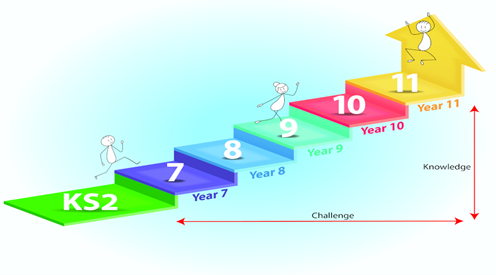Mathematics
Moving from Primary to Secondary
In year 7 we give students the opportunity to become more fluent and confident in concepts studies in primary school, while developing their depth of understanding and their reasoning skills. Students apply fundamental concepts to new and challenging context such as algebraic manipulation, prime factorisation and probability. Students also learn basic calculator skills, practicing these skills in units on area, averages and angles.
Creating Subject Experts
Helping our learners become great Mathematicians.
In the Acorn Trust we believe that it is our duty to inspire young people to see the true beauty of Maths in the wider world. We do this by bringing the four disciplines of the Maths curriculum alive!
The disciplines are:
- Number and Ratio
- Algebra
- Geometry
- Data and Probability
Students will be signposted to which area of Maths they are learning on a lesson-by-lesson basis, with the connections to both prior and future learning made as appropriate. Opportunities should be taken to explore the history, real-world application and joy of Maths frequently.
This core ideal should be modelled in our practice at all times to promote the value and enjoyment of the study of Maths to students, parents and colleagues.
Subject Disciplines (Skills)
By the time children leave our school they will: By the end of KS4 we aim for children to be fluent in the fundamentals of mathematics with a conceptual understanding and the ability to recall and apply knowledge rapidly and accurately. They should have the skills to solve problems by applying their mathematics to a variety of situations with increasing sophistication, including in unfamiliar contexts and to model real-life scenarios. Children will be able to reason mathematically by following a line of enquiry and develop and present a justification, argument or proof using mathematical language.
Subject Substantives (Knowledge)
The disciplines are:
- Number and Ratio
- Algebra
- Geometry
Data and Probability
Roadmap
Image to follow
How we assess your child
Assessment Grades KS3
Students complete assessments in each of their subjects at key points during the year which test their understanding of all the knowledge they have learnt to date (we call these cumulative assessments). We grade these assessments on a scale from 1-9 (9 being the highest). The assessments are designed so that each year they become more challenging and test students on their growing bank of knowledge.
Therefore, as an example, if your child achieves a grade 5 in an assessment in Year 7, we can predict confidently that they should go on and achieve at least a grade 5 at GCSE. This is providing they keep working hard and progressing. Please note: this prediction states “at least”. Students often achieve higher than this.
In years 7 – 9, in practical subjects (PE, Drama, Music etc.), we assess students on their practical ability and skills. This gives us a strong indication of how successful they would be if they chose one of these subjects as a GCSE option. However, in order to get a fuller view of their potential success, it is also important to consider their grades in the core subjects. This is because there is often a literacy, numeracy, or scientific element to the courses.

Assessment Grades in KS4
Students complete mock exams in each of their subjects at key points during the year which test their understanding of all the knowledge they have learnt to date. We grade these mock exams on a scale from 1-9 (9 being the highest). In the report you will see:-
- Target Grade: This is based on a student’s past performance. It is an aspirational but achievable target
- Mock Grade: The grade they achieved in the mock exam
- Predicted Grade: The grade a teacher believes a student will achieve in the final exam, if they maintain their current ATL and performance
Assessment Grades in KS5
Students complete mock exams in each of their subjects at key points during the year which test their understanding of all the knowledge they have learnt to date. We grade these mock exams on a scale from A*-E/Distinction* - Pass. In the report you will see:-
- Target Grade: This is based on a student’s past performance. It is an aspirational but achievable target
- Mock Grade: The grade they achieved in the mock exam
- Predicted Grade: The grade a teacher believes a student will achieve in the final exam, if they maintain their current ATL and performance
Exam Board Information
The GCSE mathematics course has two tiers of entry: higher (grades 9-4) and foundation (grades 5-1). Careful consideration will be paid to the decision as to which tier students will be entered for, with some students switching between tiers at the end of year 10. Much of the course is common to both tiers.
GCSE Assessment
Assessment is 100% by examination. There are three papers which must all be taken at the same tier. Each paper covers the whole content of the syllabus
Paper 1 – 1h 30m – non-calculator
Paper 2 – 1h 30m – calculator
Paper 3 – 1h 30m – calculator
Each paper has an equal weighting on the overall grade.
Exam Board: Pearson
Specification Code: 1MA1
Specification: Level 1/2 GCSE (9-1) in Mathematics (pearson.com)



